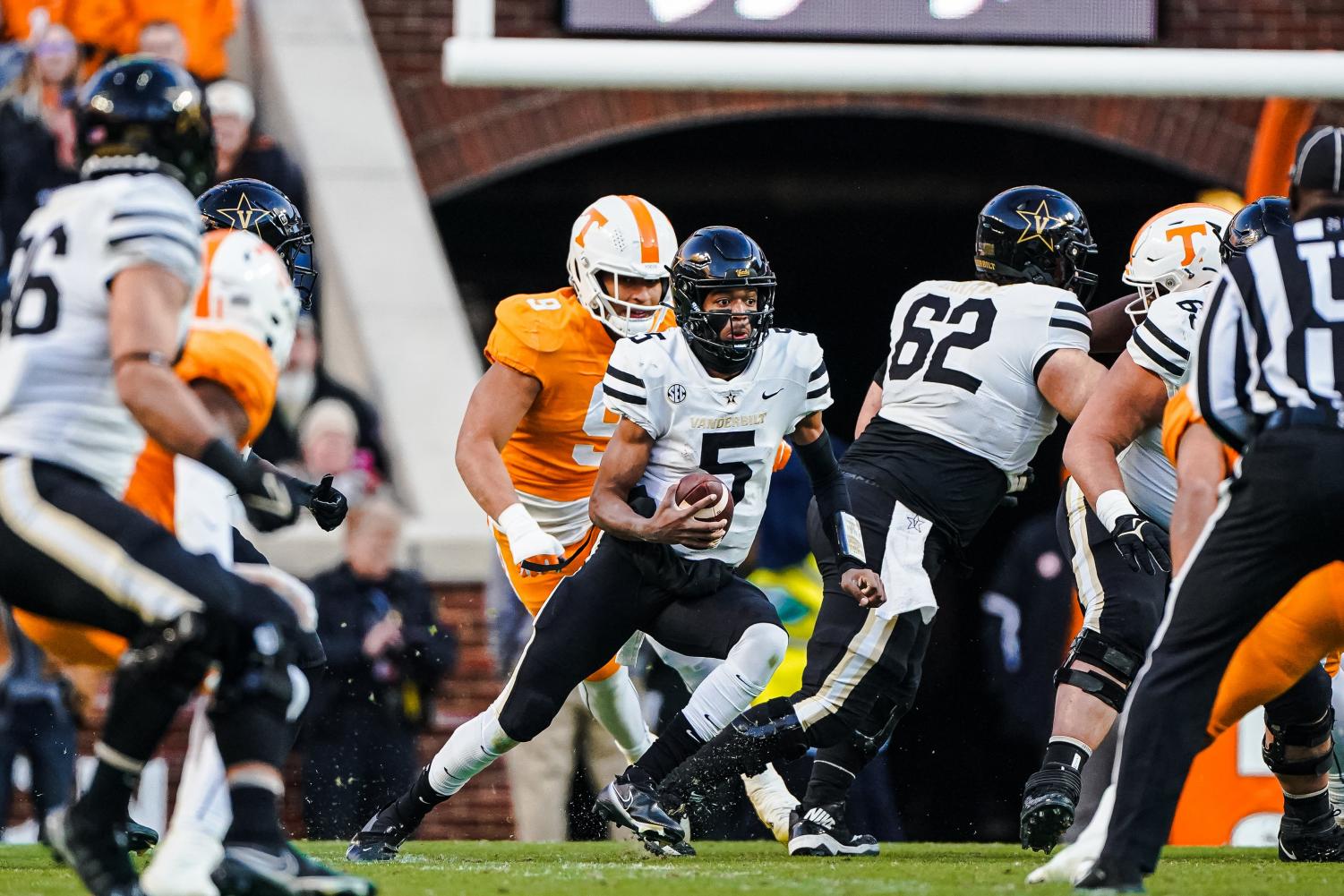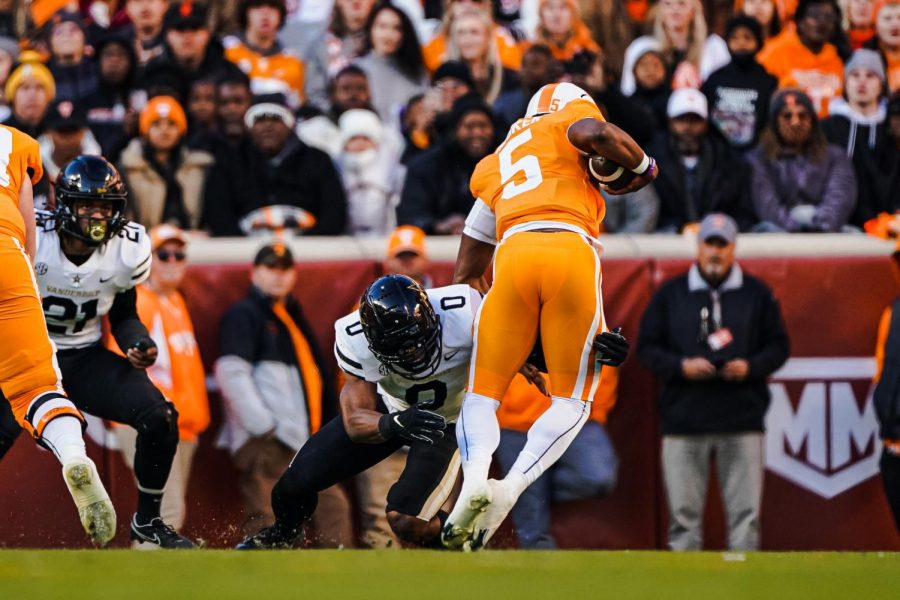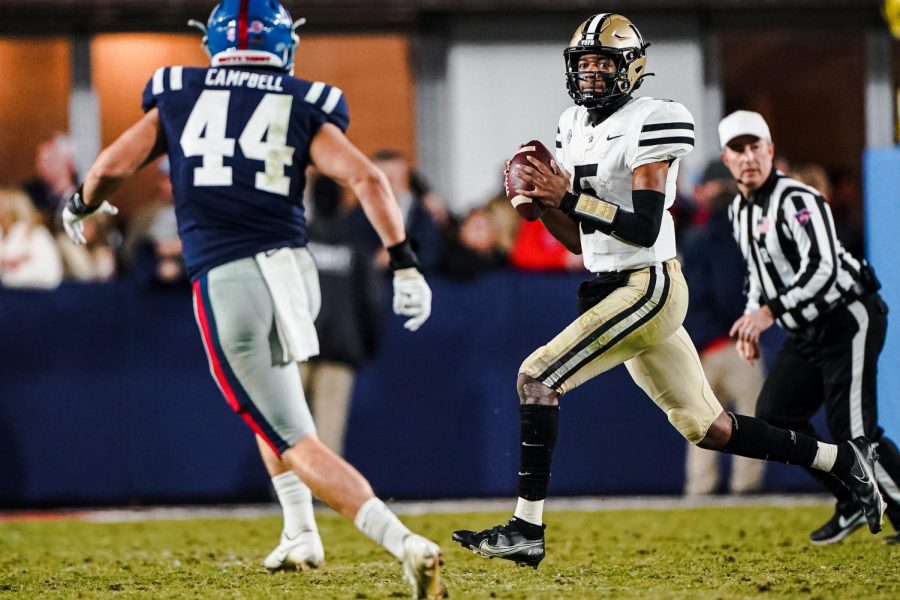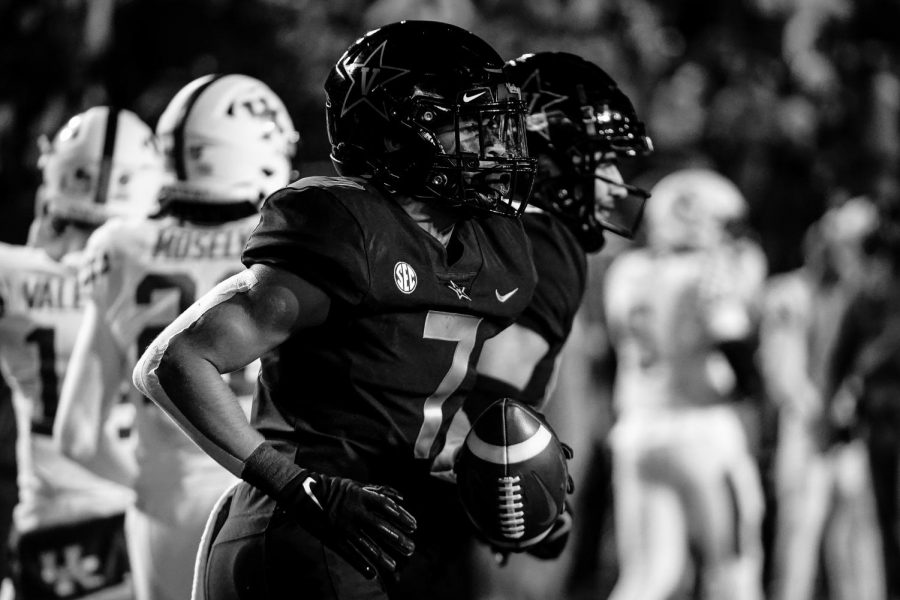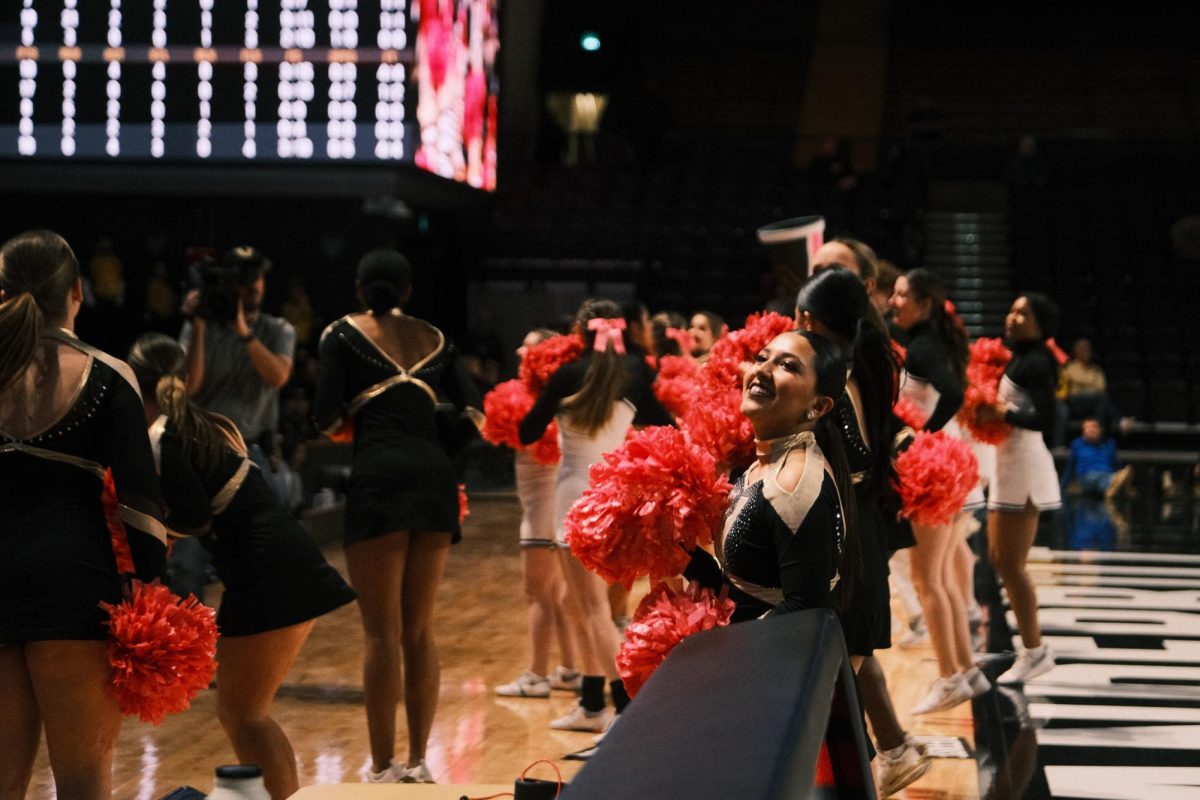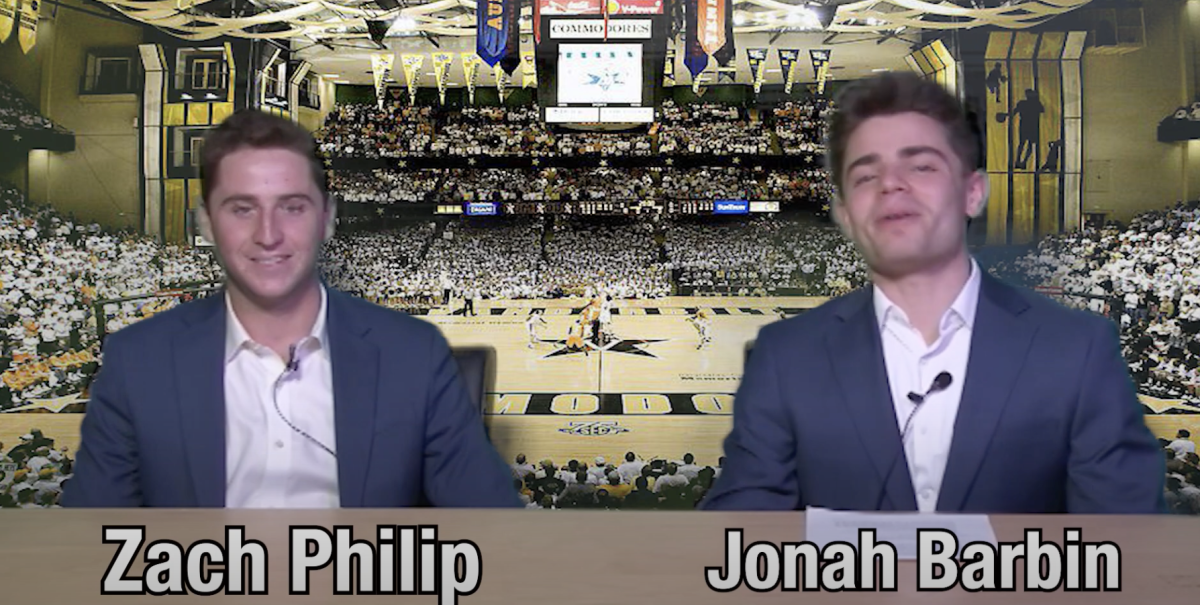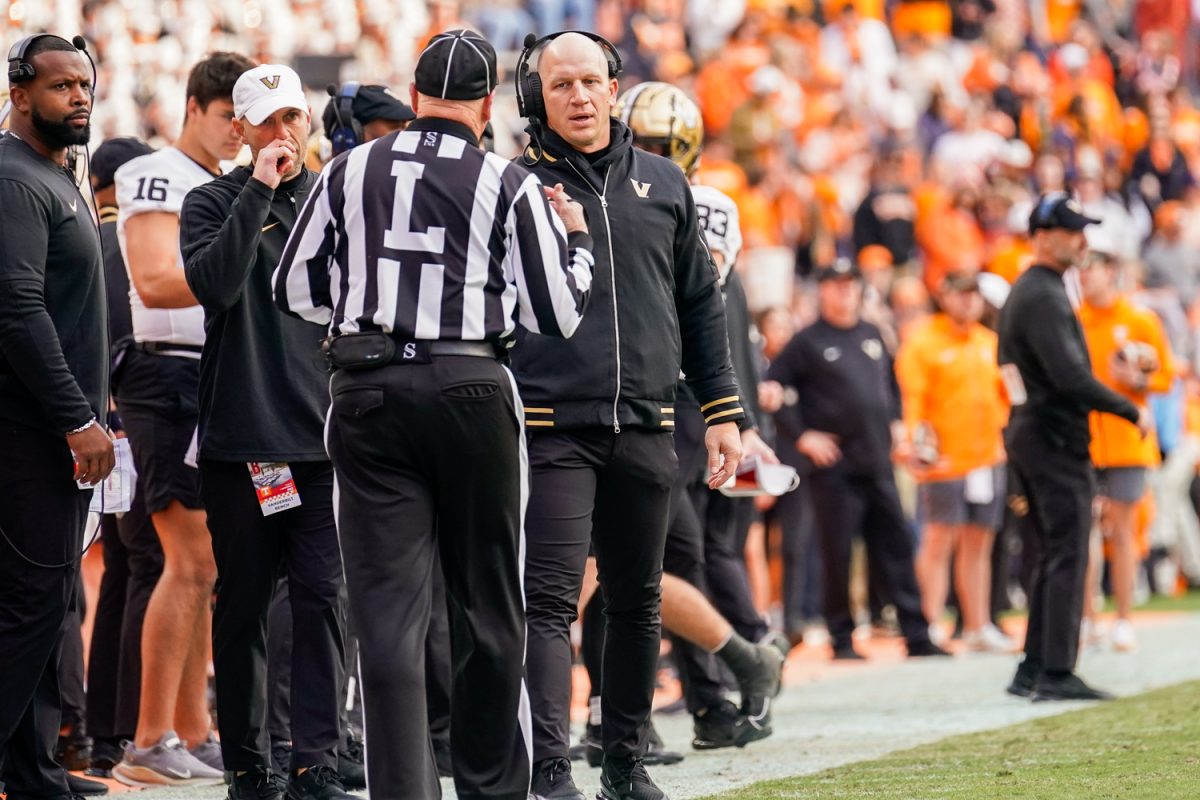The Vanderbilt Commodores capped off yet another winless SEC slate on Saturday afternoon, dropping their season finale to in-state rival Tennessee, 45-21. The loss pushed Vanderbilt’s SEC losing streak to 21 straight games dating back to 2019. The loss resulted in Vanderbilt’s first 2-10 season since 2010. But the loss closed the door on the rock bottom of Vanderbilt football.
Entering this season, each and every one of us knew that wins simply could not be the barometer of success. But with each passing day, more wins should be reasonably expected out of this program, and that begins in 272 days in Hawaii.
Without directly saying it, first-year head coach Clark Lea implied that exact sentiment throughout his inaugural season: success needs to be defined in internal ways.
“In the end, I’m a competitor, and I didn’t come to Vanderbilt to do anything other than win. So for me, it’s about how we design this team, how we design our tactics, how we develop as people and as teammates to put ourselves in the best position to win games,” Lea said at SEC Media Day this past summer. “We can be the best physically and mentally conditioned team in the country. We can impose our will on our opponent late in the game.”
He reiterated this statement time and again throughout a grueling 2021 campaign. Each and every time, his underlying message was rational: This year was about development, and this roster was simply not built to compete in the best college football conference in the country—yet.
A roster that saw 20-plus members depart rose to the occasion on the road to beat Colorado State. An offense that primarily relied upon freshmen and sophomore linemen and backfield pieces pushed South Carolina to the brink. And the Commodores’ head coach continued developing his aggressive identity throughout the season—so much so that he even went for a fourth and short on his own 12-yard line in the first half against Tennessee yesterday.
Things had to change this past offseason and they did. More things need to change this upcoming offseason and they will. This team is on its way even though short-term uncertainty still surrounds the future.
“Just as I ask the team to change and grow, I too need to change and grow,” Lea said after his team’s season finale. “We need to find those areas we can focus on and apply more energy to that will allow us to close this gap. Part of that is getting bigger, faster, stronger; developing into the gap that exists. Some of that is recruiting. And then certainly some of that is program design and making sure that I’m doing everything in my position I can do to facilitate success within this program. I know that I need to improve, and that’s my commitment that I will improve so that the team will improve too.”
The Commodores were drowned in the Volunteer offense yesterday (almost as much as Tennessee fans were in the comments of Vanderbilt football’s Twitter page) and we will talk about that. But even more pressing is a discussion surrounding the meaning of this season as a whole and where this program goes next. Last year, our final Brunch of the year predated a coaching change. This year, it predates Vanderbilt football’s most important offseason yet.
A Lot of Orange(s)
After consecutive hard-fought battles against top-tier SEC competition, Saturday’s game was less than inspiring from the Commodores. Yes, I just sung their praises in that introduction and yes I’m going to continue spinning this season positively later on, but Vanderbilt’s execution against a beatable Tennessee squad was less than optimal.
Many might argue that poor execution began hours before gametime when Reddit College Football took over the Commodores’ Twitter account—I, for one, very much enjoyed the out-of-the-box idea and the rage that came with it from a certain team’s fanbase—but the true demise began just three minutes into Saturday’s affair.
After reaching midfield thanks to a pair of sideline-to-sideline throws, Vanderbilt set up a comfortable second-and-2. Instead of running it up the middle with Rocko Griffin—who would go on to total over 100 yards for the second consecutive week—playcaller Joey Lynch dialed up yet another hashmark-to-sideline throw that Tennessee’s Theo Jackson jumped and eventually housed.
Vanderbilt found itself down 7-0 in less than three minutes and, just as in weeks past, they were unable to recover. Ironically, the only time Vanderbilt has jumped out to a first-quarter lead was in Week 1 against ETSU in a game that I do not need to remind anybody of.
In the subsequent 11 weeks, the Commodores found themselves trailing early. They surrendered eight first-drive touchdowns, two first-drive field goals and then a pick-six to top it off in Week 13.
Part of that is certainly execution. But a lot of that is coaching, and it starts with Lea. Having your team both mentally and tactically ready to hit the field is something he and his staff have simply not mastered. That has to change, especially if Vanderbilt wants to find ways to compete as it continues rebuilding its roster.
As the game progressed, it never felt as though Vanderbilt would stand a chance. Despite some early success on the defensive side of the ball, the Commodores were unable to tally any points until the unlikeliest of times: a Hail Mary at the end of the first half from Mike Wright to Will Sheppard.
Despite that momentum, the defense lost steam in the second half, giving up a pair of touchdowns to the Volunteers on their first two drives out of the locker room—both in under two minutes of possession.
“Just felt like a night where we weren’t able to get synced up. When you can’t play complementary in this league—our margin for error is so small, and we knew we were going to have to have good ball security on offense. We failed to do that in the first half,” Lea said. “We knew we needed to control the game and set the pace of the game on offense to limit the exposure on defense. We failed to do that in the first half, and we dug ourselves a hole. When we turned it on offensively [in the second half], we weren’t quite good enough on the other side to close the gap.”
One of the reasons Vanderbilt’s offense failed to get going early was because of how aggressive Tennessee was against the quarterback run. They limited Wright to very few scrambles—something he torched Ole Miss with last week—and Lynch didn’t dial up as much read option. Vanderbilt ran one really nice run-pass-option and hit Sheppard for a big gain, but relied primarily on Griffin up the middle all evening long.
Although Vanderbilt once again dominated time of possession against an SEC foe, 440 yards from Tennessee was too much to handle. Sixteen Volunteer rushes of 10-plus yards paved the way for Vanderbilt’s sixth consecutive loss and will help Tennessee—one of 13 bowl-eligible SEC teams—into a slightly better postseason draw a few weeks down the road.
Uncertainty & Adjustment
There will be change for Lea and Vanderbilt this offseason, both in terms of coaching and roster construction, but one thing that is guaranteed is that Lea himself will be sticking around—and rightfully so.
But since it was announced that offensive coordinator David Raih would not be calling plays, he has been the prime suspect for a new job this coming year. Raih spent all season in the box rather than on the sidelines, leaving Lynch, the quarterbacks coach, to call the plays on the field.
Based on on-field production and development, Raih seemingly did an excellent job with his position group, the wide receivers. The emergence of playmakers such as Will Sheppard and Devin Boddie Jr. was certainly not expected. Staples Chris Pierce Jr. and Cam Johnson also enjoyed success under his tutelage while Amir Abdur-Rahman finally broke the rotation later in the season. With a plethora of young receiving talent in Quincy Skinner Jr. and Gamarion Carter still up and coming, there is no reason Raih could not simply step into a receivers coach role. But Vanderbilt certainly cannot pay him offensive coordinator money moving forward.
Lynch showed flashes of tremendous playcalling against South Carolina and Colorado State, but also struggled to balance the stark contrast in styles between Wright and Ken Seals. The direction of Vanderbilt’s offensive war room will certainly be an offseason development to keep an eye on.
On the positive side, defensive coordinator Jesse Minter deserves another go next season. As far as improvements from this team, most occurred on the defensive side of the football.
Vanderbilt tallied at least one turnover in each of its eight SEC games this season—and multiple in three of those games—after registering just nine all of last year. Marked improvements in tackling were visible to the naked eye, and perhaps no two Commodores took larger steps forward in their development than linebackers Anfernee Orji and Ethan Barr.
The pair will finish in the top 30 of SEC tacklers, each totaling over 80 this season. Barr added a trio of interceptions as well during his sophomore campaign.
Lea will certainly endure transfers and already has with four-star freshman Marcus Bradley entering the portal four weeks ago, but the biggest question mark will remain how he uses the portal to round out this roster and what Wright and Seals decide to do.
Based on their play, neither has definitely earned the day one starting job next season, meaning the opportunity to start for an SEC program remains on the table for both of them—something neither could likely find if they transfer elsewhere.
“I think both at times showed great promise and an ability to function at a high level at the quarterback position. Then at times, we were short of that. So I think a fight for consistency is going to be important,” Lea said of his sophomore signal callers. “Both those guys have worked tremendously hard to best position our offense. Again, there are times that we’re gonna look back on the season and point to great success for each of them.”
While Seals started seven games and threw for 300 more yards, Wright totaled eight touchdowns to Seals’ six and demonstrated why he brings something different to the table. Until Vanderbilt can trust its offensive line to protect a pocket passer, Wright has shown that he gives this team the best chance to win. But that doesn’t mean there won’t be yet another competition next fall.
This is a roster that also boasts plenty of youth. Over half of the 26 freshmen on the team saw action in their first years, including names like Patrick Smith, Delfin Xavier Castillo and Devin Lee, all of who started games at various points.
“I’ve never been more energized for where we’re headed,” Lea said. “I look at the guys in the room, I look at the nucleus of the team returning, I think about how much I know about what’s needed and where we need to strengthen, I’m so excited about where we’re headed. We have the opportunity for exponential growth this offseason.”
A Team One Farewell
“I told the team in the locker room after the game, the clock has already started on year two and TeamTwo.”
Most Vanderbilt fans will have no hesitation in agreeing with Lea and moving on from this season. It will long be remembered as Vanderbilt’s second consecutive winless conference performance. But Team One certainly deserves one last goodbye before turning the page.
Since he arrived, Lea has stressed that absolutely nothing that came before him and his program would be focused on; that Vanderbilt football had entered a new generation on a blank slate. But many of the faces who enabled that change to happen will depart this year, one being Chris Pierce Jr.
Pierce Jr. put a cap on one of the most unique college football careers in NCAA history with four more catches, 45 yards and a two-point conversion Saturday. But what speaks much louder is the ringing endorsement he gave Lea following the game.
“I won’t be a part of that, but I am so excited for the future of this team, for the future of Coach Lea because I truly believe he can take this program to places it needs to be,” Pierce Jr. said after his final game in the Black and Gold. “I’m appreciative of what Vanderbilt has done for me. I’m excited for this team, I’m excited for my future. I have no regrets.”
Each passing day provides new data points on whether Lea is truly the coach to raise Vanderbilt from its history of SEC mediocrity. Wins aren’t fair indicators of success just yet, but what happens off the field and how his players feel about him certainly are—Pierce Jr.’s comments validated much of what Lea has tried to do since being hired last December.
“I think in year one, I’m so disappointed with the season. I’m disappointed that we fell short in this game. I’m frustrated with what I felt like was going to be our best performance tonight,” Lea said. “We have a long way to go, but we have special people who will close the gap rapidly so long as we make the right choices.”
The aforementioned development of various underclassmen, the few victorious moments and an evident positive trajectory can be taken from this season. This program is far from where it needs to be, but cautious optimism is a fair takeaway moving into next season.
“What I learned—as frustrated as I have been this year and as painful as the results have been, I think that pain is a part of progress. I feel excited and energized to take all this frustration I have and start applying it toward our process in year two,” the first-year head coach said.
Two wins won’t cut it moving forward—both Lea and athletic director Candice Lee have much higher standards, I can personally guarantee you that. I will leave you with this; my last attempt at a bit of lighthearted Commodore Brunch comedy before passing the torch to yet another generation of Hustler sports editors: Lea’s squad concluded its 2021 season 6-6 against the spread.
Where I come from, six wins makes you bowl eligible.


